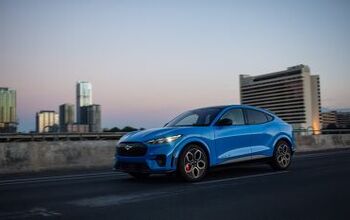Tesla Birth Watch 4: CBS Hearts "Scrappy Little Tesla Motors"
CBS' Sunday Morning program has joined the caravan of love for Tesla Motors' not-ready-for-prime-time electric car and GM's not-ready-for-prime-time electric car. New York Times correspondent David Pogue's report leads with the usual "gas sucks" mantra, and then gets down to business: repeating Tesla's oft-repeated (never proven) claims for their LiIon-powered electric roadster. Ah, but doesn't the electric car simply shift the energy problem to powerplants? The recently demoted Martin Eberhard demures: "If you do the math, you'll find that an electric car, even if you use coal to make the electricity, produces less pollution per mile than burning gasoline in the best gasoline-powered car." After gasping at the Tesla's sticker, Pogue trots out GM Car Czar Maximum Bob Lutz, who promises a user-friendly price tag for the Volt: "My personal target still is to bring this car into the market at, you know, nicely below $30,000." Yeah, well what about the EV1? "Now, it turns out that from a PR standpoint probably the dumbest move we ever made," Lutz said. "It was done for all the right legal reasons, but PR-wise it was dumb. So, now I'm getting e-mails saying, 'I hope you rot in hell.'" After revealing that the first Teslas will hit the streets this fall and promoting the forthcoming film "Who Saved the Electric Car?" (really), Pogue gives Maximum Bob the last word. "…I think the future for electrics is absolutely unlimited." At least the PR is.
More by Robert Farago

































Comments
Join the conversation
A Volt for "nicely below $30,000?" What is that, $29,900 but if you want tires...? Is Lutz aware that the MSRP on a Camry hybrid is only $25,200? And the invoice is in the neighborhood of $22,700? That the Prius MSRP is under $21,000? Does Lutz think I'm likely to pay a $5,000-$8,000 premium for a first-model year Chevy Volt? I mean, if they ever have one available for sale? Somebody should tell Lutz that, if he's selling vaporware, he might as well price it aggressively. The profit margin doesn't change with the price.
This is what I don't understand - Tesla roadsters will use a lithium-ion battery system. This is the same kind of battery that is currently present in laptops, among many other things. Laptop batteries work in the same constant "charge/drain/charge" cycle that Tesla's batteries will have to work in. Laptop batteries also lose their charge capacity like crazy, usually by about 20% but sometimes up to 30-40% in a year, depending on operating temperatures and frequency of charge/discharge cycles. How is Tesla even planning to work around that? Wouldn't their car's batteries also lose capacity at a crazy rate, given that the cars will probably face much more temperature variation than a laptop (what with the weather and the seasons and all)? I know I wouldn't want to buy a $100K car to have its maximum range go down even by 20-25% in just a year.
Since he was speaking to CBS, Mr. Eberhard should have shown how the Tesla's superior braking technology would keep it planted even at full throttle. "No 'sudden acceleration' here, Mr Pogue."
Laptop batteries are located next to a hot microprocessor, and they are typically kept at a high charge level much of the time (when the laptop is plugged in), and I believe the charge rate is usually quite high. Those are the worst possible conditions for battery service life. The Tesla Roadster has a liquid cooling system to keep its cells from getting too hot. I understand it also has a charging option which lets you keep your car at 50%, 90% or 100% capacity. If you keep it at lower capacity most of the time, it should extend the life expectancy of the batteries. So for example. . . You could keep it set on 50% most of the time, and then set it up to 90% or 100% the night before taking a longer trip. Tesla have told us the battery is fully warranted for one year, and warranted on a pro-rated basis out to five years. So. . . If they really do start dying after a year or two, Tesla will be looking at a bunch of very expensive replacements under warranty.